Bellis Perennis is a common European species of daisy, of the Asteraceae family, often considered the archetypal species of that name.
Contents
Uses
Culinary
This daisy may be used as a potherb. Young leaves can be eaten raw in salads or cooked, noting that the leaves become increasingly astringent with age. Flower buds and petals can be eaten raw in sandwiches, soups and salads. It is also used as a tea and as a vitamin supplement.
Herbal medicine
Bellis perennis has astringent properties and has been used in herbal medicine. In ancient Rome, the surgeons who accompanied Roman legions into battle would order their slaves to pick sacks full of daisies in order to extract their juice, hence the origin of this plant’s scientific name in Latin. Bandages were soaked in this juice and would then be used to bind sword and spear cuts.
Bellis perennis is still used in homeopathy for wounds and after certain surgical procedures, as well as for blunt trauma in animals. Typically, the plant is harvested while in flower when intended for use in homeopathy.
Bellis perennis flowers have been used in the traditional Austrian medicine internally as tea (or the leaves as a salad) for treatment of disorders of the gastrointestinal and respiratory tract
Benefits
People take wild daisy tea for coughs, bronchitis, disorders of the liver and kidneys, and swelling (inflammation). They also use it as a drying agent (astringent) and as a “blood purifier.”
Wild daisy is sometimes applied directly to the skin for wounds and skin diseases.
Cautions
- There isn’t enough information to know whether wild daisy is safe.
Special Precautions & Warnings:
Pregnancy and breast-feeding: Not enough is known about the use of wild daisy during pregnancy and breast-feeding. Stay on the safe side and avoid use.
Allergy to ragweed, daisies, and related plants: Wild daisy may cause anallergic reaction in people who are sensitive to the Asteraceae/Compositae plant family. Members of this family include ragweed, chrysanthemums, marigolds, daisies, and many others. If you have allergies, be sure to check with your healthcare provider before taking wild daisy.
Interactions
- We currently have no information for bellis perennis (wild daisy) Interactions.
Other names
Bellis, Bruisewort, Margarita Común, Pâquerette, Pâquerette Margueritte, Pâquerette Vivace, Petite Marguerite
References
Source: Wikipedia, https://en.wikipedia.org/wiki/Bellis_perennis

